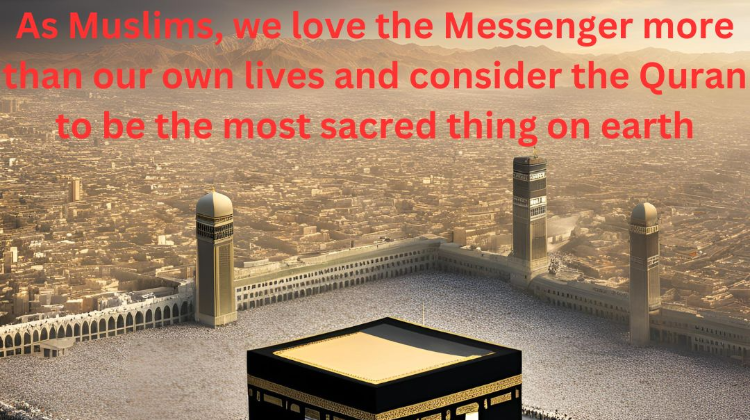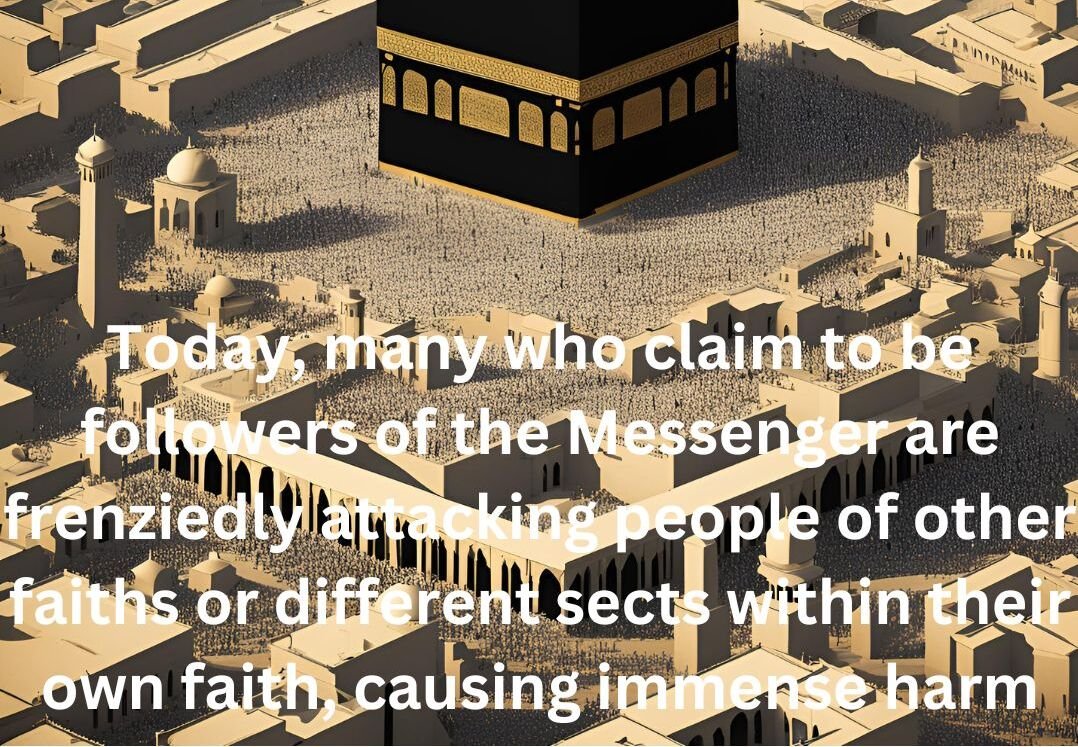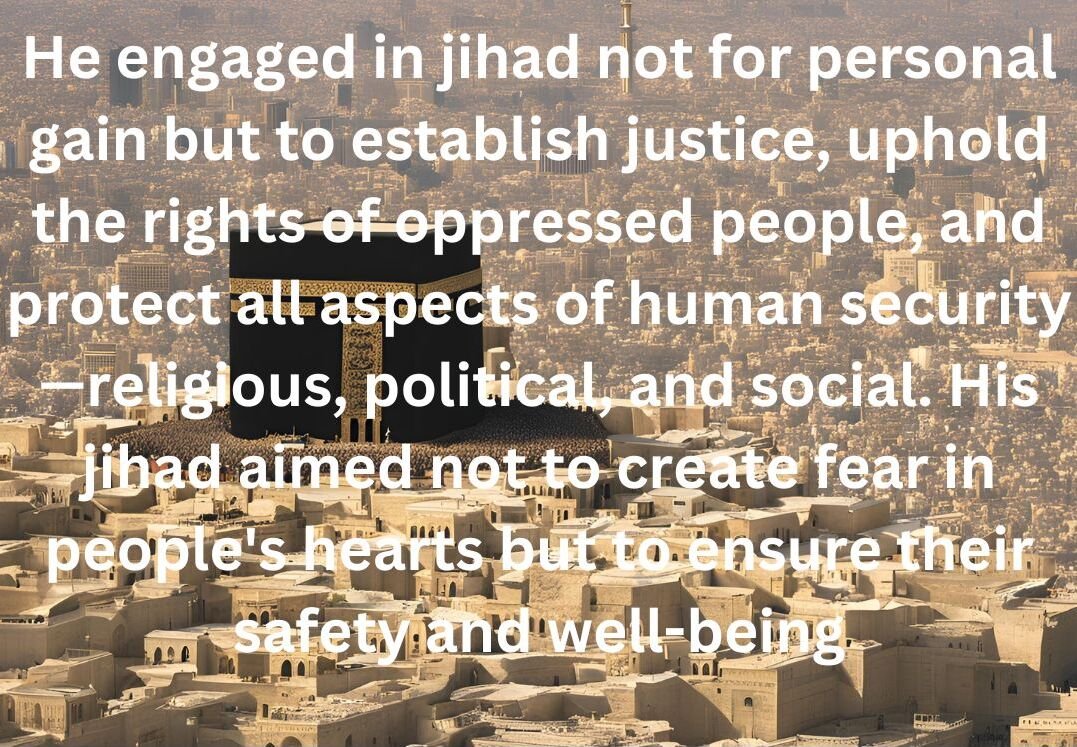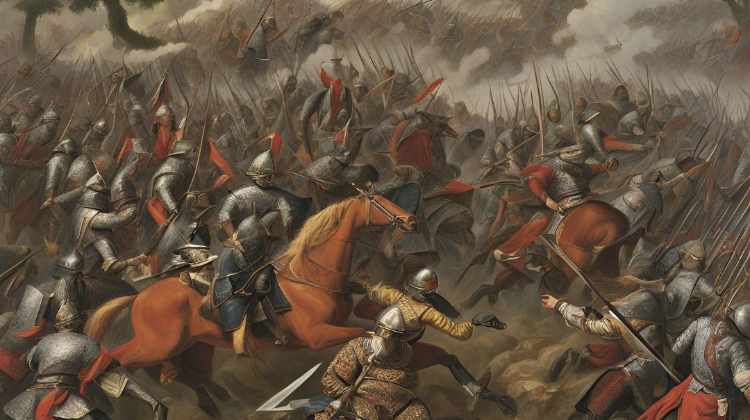Reacting to Insults: Madness or Tolerance?

As Muslims, we love the Messenger more than our own lives and consider the Quran to be the most sacred thing on earth. Therefore, when someone insults the Messenger or the Quran, it is only natural to protest. We also protest in our country, but it is our duty to know how the Messenger himself would have reacted in similar situations. Every now and then, in our country, due to offenses against religious sentiments, enraged crowds attack and vandalize Hindu temples, homes, and shops in various districts. Political leaders exploit these incidents for their own interests. They too fuel the fire of terrorism, and all this is done in the name of religion. In India, similar actions are carried out in the name of Hinduism. Among the followers of both religions, there are extremist groups that creates these issues and engages in activities that are destructive to humanity. Anti-religionists also take this opportunity to criticize Islam. They try to prove that Islam is a religion of terrorism, that it is intolerant of other beliefs, that it does not fit in with modern civilized society, that Muslims are terrorists, militants, barbaric, and ruthless.
our country, but it is our duty to know how the Messenger himself would have reacted in similar situations. Every now and then, in our country, due to offenses against religious sentiments, enraged crowds attack and vandalize Hindu temples, homes, and shops in various districts. Political leaders exploit these incidents for their own interests. They too fuel the fire of terrorism, and all this is done in the name of religion. In India, similar actions are carried out in the name of Hinduism. Among the followers of both religions, there are extremist groups that creates these issues and engages in activities that are destructive to humanity. Anti-religionists also take this opportunity to criticize Islam. They try to prove that Islam is a religion of terrorism, that it is intolerant of other beliefs, that it does not fit in with modern civilized society, that Muslims are terrorists, militants, barbaric, and ruthless.
But are those who practice violence and terrorism in the name of the peaceful religion of Islam truly followers of the Messenger? Let us see how the Messenger himself would have responded in such situations.
Incident 1: Treatment toward Person who urinated in the Mosque
Abu Huraira (RA) narrated that once a Bedouin urinated in the Messenger's Mosque. The people saw this and rushed towards him. But the Messenger (SAW) stopped them and said, "Let him finish his task, then pour a bucket of water over the spot and clean it. Remember, you have been sent to make things easy, not difficult" (Hadith - Bukhari, Kitabul Wudu 1/35).
Afterwards, the Messenger calmly explained to the man that the mosque is the house of Allah, where Salah is established, and it is a sacred place where such acts should not be done. The Messenger was aware of the Bedouin's ignorance and did not allow the situation to escalate among the other companions. He intervened immediately and resolved the issue in a gentle and natural manner.
 On the other hand, what might happen if such an incident occurs today? There is no need to guess; I will provide evidence. Just a few days ago in Lalmonirhat, a man named Jewel accidentally knocked a Quran off a shelf in a mosque, causing it to fall to the ground. Someone present there spread the rumor that the Quran had been disrespected. In the end, he was beaten to death, and then his body was burned in a barbaric celebration. Despite kissing the Quran a thousand times and begging for forgiveness at their feet, he couldn't escape the hands of the bloodthirsty mob. Are these people truly followers of the Messenger who did not even show the slightest anger when he saw an ignorant Bedouin urinating inside the mosque? The Messenger fought for the establishment of truth. His jihad was against overwhelmingly powerful forces. He never displayed power against weak and helpless people.
On the other hand, what might happen if such an incident occurs today? There is no need to guess; I will provide evidence. Just a few days ago in Lalmonirhat, a man named Jewel accidentally knocked a Quran off a shelf in a mosque, causing it to fall to the ground. Someone present there spread the rumor that the Quran had been disrespected. In the end, he was beaten to death, and then his body was burned in a barbaric celebration. Despite kissing the Quran a thousand times and begging for forgiveness at their feet, he couldn't escape the hands of the bloodthirsty mob. Are these people truly followers of the Messenger who did not even show the slightest anger when he saw an ignorant Bedouin urinating inside the mosque? The Messenger fought for the establishment of truth. His jihad was against overwhelmingly powerful forces. He never displayed power against weak and helpless people.
Incident 2: The Messenger Muhammad (SAW) at the Funeral of the Hypocritic Leader
Ubay ibn Salul openly claimed to be a Muslim. He would go to the mosque, pray in congregation, attend all discussions, and even participate in the organization of jihad. However, at the same time, he was constantly conspiring against the Messenger to undermine the unity and morale of the believers. He would question any decision made by the Messenger. Many companions, including Umar (RA), and even his own son, sought the Messenger’s permission to kill him, but the Messenger did not allow it. He showed patience so that Abdullah bin Ubay's hypocrisy would reveal itself, and his followers would see the true nature of their leader. The Messenger said, "If I kill him, people will say, 'Look, Muhammad (SAW) is killing his own companions.'”
When this hypocritical leader died, the Messenger participated in his funeral. By the time the Messenger arrived, he had already been placed in the grave. The Messenger ordered his body to be taken out of the grave. Then he placed the body on his own knees, applied his blessed saliva to the body, and dressed him in his own garment before burying him (Hadith - Bukhari, Kitabul Janaiz 1/182).
This was the extent of the Messenger's tolerance. Yet today, many who claim to be followers of the Messenger are frenziedly attacking people of other faiths or different sects within their own faith, causing immense harm.
Incident 3: Responding to the Misconduct of a Jewish Businessman
A Jewish Rabbi named Zayd had a transaction with the Messenger of Allah (peace be upon him) on credit. A few days before the due date, he came and demanded payment. He even rudely pulled the Messenger's cloak and said in a harsh tone, "O Muhammad! I know you. You and your people, the descendants of Abdul Muttalib, are notorious for delaying payments." Umar Farooq (may Allah be pleased with him) was present there. Seeing this rude behavior towards the Messenger, he became furious and scolded the Rabbi. However, the Messenger told Umar, "O Umar! He and I deserved a different behavior from you. You should have advised me to promptly pay his due, and you should have urged him to be polite in his words and actions." Then, the Messenger ordered Umar to pay the Rabbi and give him 20 extra measures of dates as compensation for Umar's scolding. Notice how the Messenger did not tolerate even a slight rebuke towards a person of another faith.
harsh tone, "O Muhammad! I know you. You and your people, the descendants of Abdul Muttalib, are notorious for delaying payments." Umar Farooq (may Allah be pleased with him) was present there. Seeing this rude behavior towards the Messenger, he became furious and scolded the Rabbi. However, the Messenger told Umar, "O Umar! He and I deserved a different behavior from you. You should have advised me to promptly pay his due, and you should have urged him to be polite in his words and actions." Then, the Messenger ordered Umar to pay the Rabbi and give him 20 extra measures of dates as compensation for Umar's scolding. Notice how the Messenger did not tolerate even a slight rebuke towards a person of another faith.
This tolerant behavior of the Messenger became the reason for Zayd's conversion to Islam. On his way back, Zayd said to Umar, "O Umar! I am the Jewish scholar Zayd ibn Sana. Actually, my purpose was not the transaction, but rather to test the forgiveness and tolerance of the Messenger. One of the qualities of the final Messenger is that his patience and tolerance will be remarkable. The more he is treated rudely, the more his forgiveness will increase. Therefore, Umar, I have achieved what I wanted." After this, he wholeheartedly embraced faith at the hands of the Messenger (peace be upon him) and donated half of his immense wealth to the Muslim community. (Musnad Ahmad, 3/153, Akhlaqun Nabi, p. 124)
It is important to remember that this incident took place in Medina when the Messenger was the head of state. Despite this, he did not show any kind of force towards the ill-behaving Jew.
Incident 4: Forgiving Hind ( the Person who caused his Uncle, Hamza (RA)’s death )
Hamza (may Allah be pleased with him) was the beloved uncle and guardian of the Messenger (peace be upon him). He was on of the greatest warrior in the Muslim army. He achieved martyrdom in the Battle of Uhud. After his martyrdom, the Messenger wept so much that he was never seen crying like this at any other funeral. Abu Sufyan's vengeful wife, Hind, personally cut open Hamza's stomach, took out his liver, and chewed it. Despite this barbaric and brutal act, the Messenger forgave Abu Sufyan's wife after the conquest of Mecca. The Messenger never reproached Hind for her past life and actions.
Incident 5: Forgiving the Poisoner
After the Jews' crushing defeat at Khaybar, a Jewish woman named Zaynab bint Al-Harith invited the Messenger of Allah (peace be upon him) for a meal and served him mutton. The Messenger and Bashir bin Bara (may Allah be pleased with him) began to eat. Upon tasting the food, the Messenger immediately realized it was poisoned and stopped eating, but Bashir, having consumed some, fell ill and died a few days later due to the poison. When the Messenger asked Zaynab why she did this, she replied, “If you were a king, you would die from the poison and we would be rid of you. But if you were a Messenger, Allah would inform you.”
pleased with him) began to eat. Upon tasting the food, the Messenger immediately realized it was poisoned and stopped eating, but Bashir, having consumed some, fell ill and died a few days later due to the poison. When the Messenger asked Zaynab why she did this, she replied, “If you were a king, you would die from the poison and we would be rid of you. But if you were a Messenger, Allah would inform you.”
The Messenger said, “Allah has not given you the power to kill me.” Despite the attempt on his life, the Messenger forgave her for trying to kill him. However, he sentenced Zaynab to death for the murder of Bashir (may Allah be pleased with him).
Incident 6: Forgiving the one who endangered his daughter's life
Habbār ibn Aswad had violently pushed the Messenger of Allah (peace be upon him) daughter Zaynab (may Allah be pleased with her) during her migration, causing her to fall from her camel's litter onto the rocky ground. This led to her miscarriage. After the conquest of Mecca, Habbār ibn Aswad accepted Islam, and the Messenger forgave him as well.
Incident 7: Reaction to the Bedouin's rude behavior
Narrated by Abbas ibn Malik (may Allah be pleased with him), one day the Messenger of Allah (peace be upon him) was wearing a Najrani cloak with a thick border. When he encountered a Bedouin Arab on the road, the Bedouin grabbed the Messenger's cloak and pulled it so forcefully that it left marks on his neck. Then the Bedouin said, "Order that I be given some of Allah's wealth that you have." The Messenger turned to him, smiled, and ordered that he be given what he requested. (Hadith Bukhari, Book of Jihad)
Incident 8: The announcement of General forgiveness on the day of the conquest of Mecca
When faced with severe persecution from the Quraysh in his birthplace of Mecca, the Messenger of Allah (peace be upon him) was compelled to migrate. After eight years, he returned to Mecca with ten thousand companions in a peaceful conquest known as the Conquest of Mecca. In this campaign, the Messenger achieved victory without warfare. He entered the Kaaba and addressed the gathering saying, "There is no deity but Allah, alone without any partners. He has fulfilled His promise, aided His servant, and alone has defeated all the confederates."
Then he asked, "O people of Quraysh! What do you think I will do with you?" They all replied, "We expect good from you. You are a noble brother and the son of a noble brother."
The Messenger (S.A.W) said, “ Then I will tell you the same that Yusuf (AS) said to his brothers, ‘Today there is nothing against you, no complaints, you are free.’ History has stood witness to the fact that the person who underwent severe unjust persecution for thirteen years continuously, without retaliation, even after obtaining the change of extract full revenge, forgave the extreme adversaries. His enduring patience and exemplary forgiveness established a paradigm for the ummah until the Day of Judgment.
Such forms of forgiveness, generosity, tolerance, and compassion find numerous examples in the holy biography of the Messenger of Allah. He engaged in jihad not for personal gain but to establish justice, uphold the rights of oppressed people, and protect all aspects of human security—religious, political, and social. His jihad aimed not to create fear in people's hearts but to ensure their safety and well-being. Therefore, as followers of the Messenger, it is our duty to refrain from prejudging or selectively promoting any agenda, not to retaliate one wrongdoing with another, and to ensure justice through fair judicial means for anyone who commits an offense.
Images Related to this Post



















Leave a Comment